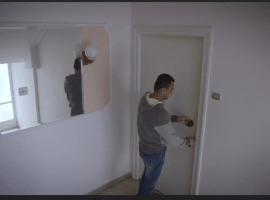Curing the Limbo launches co-Athens initiative

Refugees and locals meet online to cook popular vegan dishes from Syria, Nigeria and Afghanistan. Others run a platform that collect local stories and urban myths from Athens and create songs and theater plays based on them. A place-making initiative in a derelict public neighbourhood park brings closer the local community around the common need for a football field. A green energy cooperative emerges out of community meet-ups, collaborative educational workshops and pilot activities that helps people get lower cost electricity. These are just a few of the co-Athens funded initiatives being developed by refugees and locals in the neighbourhoods of Athens.
Co-Athens empowers collaborations among refugees registered in Curing the Limbo integration program led by the City of Athens and local citizens’ groups who co-develop actions with positive impact for the city’s neighbourhoods. Co-Athens is testing a new model for social inclusion based on equal participation opportunities for refugees and locals and the active role of local communities and citizens in the process of social integration.
So far, 20 public activities have taken place online involving more than 500 participants, 100 of which have been refugees living in Athens. Through those actions, co-Athens community groups have created synergies with a range of stakeholders from the civil society (grassroots, individual citizens, small and medium NGO’s), the private sector (donors, local businesses), government and public institutions (municipality services, organizations and political leadership, local public schools, National University) and knowledge centers (National Technical University Lab) which are operating in the city, thus reinforcing the engagement with the local community of actors.
The collaborative projects being nurtured by the program are already challenged to overcome the difficulties of intercultural communication among their members, set equal roles and responsibilities, work closely with the local communities and implement ideas that have been co-created by a diverse group of actors. At the same time, the second -and now the third- wave of the COVID-19 pandemic has brought the co-Athens community groups to face an additional volume of challenges. How could co-Athens initiatives engage actively with residents of Athens living through the current conditions of social distancing? How could cohesion be sustained among the members of the groups themselves? How does the notion of intervention in public space changes under the current circumstances and what are the opportunities for action that emerge in the current context?
Main objective of co-Athens is to bring people closer around the development of creative but pragmatic ideas that could impact the city through their public actions. The initiative and its smaller funded collaborative programs were designed to deliver in a totally different context from the one they are actually unfolding and as result we had to re-approach some of our priorities and many of the planned activities that would have initially been implemented in the public space have been transferred to the digital world through interactive online workshops, networking events, and meetups.
Co-Athens will be completed in June 2020. With the expectation that, until then, a level of normality will be brought back in everyday life, the co-Athens collectives and its members are now hoping that they will be able to implement at least a part of their remaining action plan in physical, real-life conditions. This is a commonly expressed desire for everyone involved. Until then, there is a strong feeling amongst the team members that something positive has come out of the common challenge we face. If anything, the pandemic condition has led them to explore new ways of getting and acting together, sharpening their creativity, escaping their limbo, and remaining active and hopeful.

 Integration of migrants and refugees
Integration of migrants and refugees


















